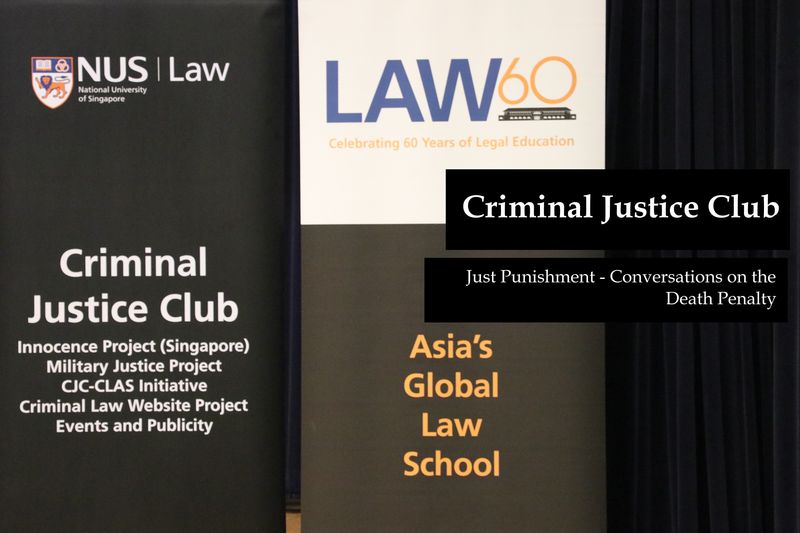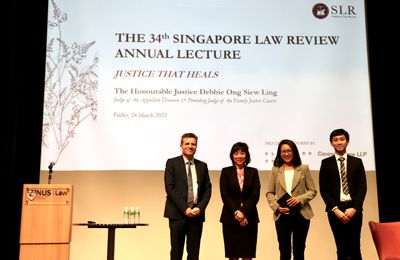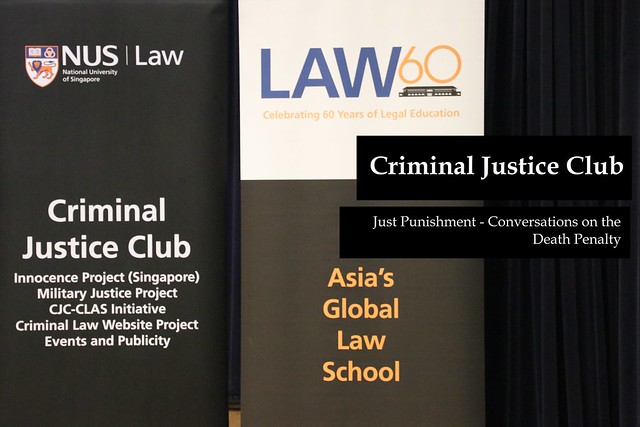
Singapore’s death penalty is shrouded in constant debate, both within and beyond Singapore’s borders. Its exercise and usage has often been privy to public speculation. Some decry the death penalty to be against human rights, or to be abolished altogether, saying that it is simply unnecessary. Others stand by it, describing it as a powerful deterrent With the increasing frequency of such debates over the use of the death penalty, how should Singapore respond?
This year, on the 27th of October, the Criminal Justice Club (CJC) organised a dialogue titled “Just Punishment: Conversations on the Death Penalty”, aiming to provide a more nuanced study of capital punishment in Singapore. Other areas including judicial discretion, comparative jurisdiction and the functions of a criminal justice system were also considered. The ultimate objective of the event was to provide a more coherent picture of Singapore’s death penalty and to foster healthy dialogue on crime and punishment in Singapore. And a robust dialogue we had! CJC asked a number of prominent individuals and outspoken voices on the death penalty to speak at the event. Click on through to read more!
The panel that day also had 3 specific questions to tackle:
- What is the rationale behind the amendment of s33(b) of the Misuse of Drugs Act to allow judges the discretion to not give the death penalty, and is it sufficient to ensure just and fair punishment?
- As compared to other jurisdictions where crime rates are similar to Singapore’s, without the imposition of the death penalty, is the policy of deterrence still a relevant justification for capital punishment in Singapore?
- Are there any other ways to serve justice without the death penalty? What function does the death penalty serve beyond deterrence, and can it be replaced? Should a criminal justice system be primarily punitive?
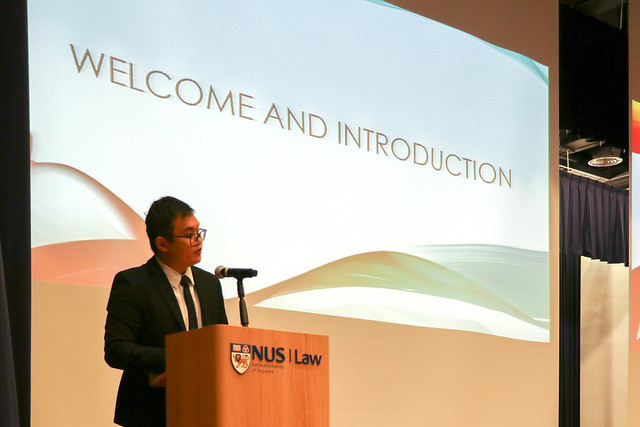
The dialogue started proper with president of CJC, Mr. Long Shi Han, describing the genesis and mission of the CJC, listing out its various and illustrious branches such as the Military Justice Project (MJP). He then clarified that the club was not against or for the death penalty per se, but rather, sought to create an environment and dialogue where both sides could see from the other’s point of view.
After his introduction, he then passed the time over for opening remarks by Ms. Barbara Plinkert, Head of Mission of the Delegation of the European Union to Singapore.
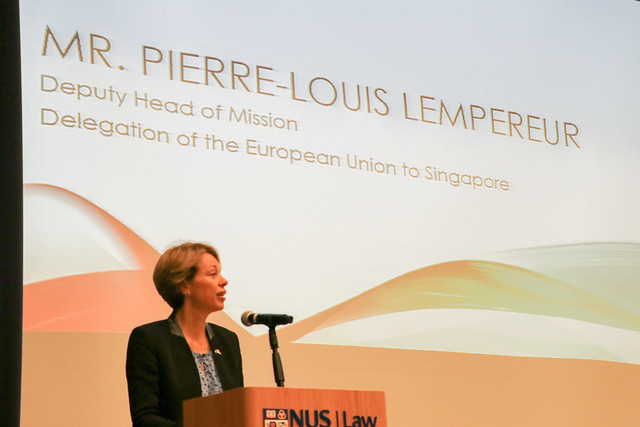
Ms. Plinkert spoke on behalf of Mr. Lempereur.
The speaker acknowledged increasing calls for the abolition of the penalty in the EU. She then talked about the Joint Declaration on the European and World Day against the Death Penalty, published every year on the 10th of October and lists out arguments promoting abolition of capital punishment. All the member states of the EU have abolished the death penalty. Furthermore, abolishing the death penalty is now a pre-requisite to join the EU, pursuant to Art 6 and 22 of the EU Charter of Fundamental Rights. (Art 22, in particular, is against the death penalty.)
The speaker also took time to speak about parties who should be excluded from the death penalty, such as pregnant women and the elderly, or cases where evidence is not conclusive beyond all reasonable doubt. She emphasised the need for multilateral conversations, and highlighted the importance increasing discussion in the United Nations over the death penalty, such as moratoriums or reviews of member-states. In contrast, the EU’s position is clear – the death penalty has no proven deterrent effect against crime, and is in contravention of the universal right to life and to be free from degrading punishment.
Lectures and Speeches
After opening remarks, the speakers began their speeches proper.
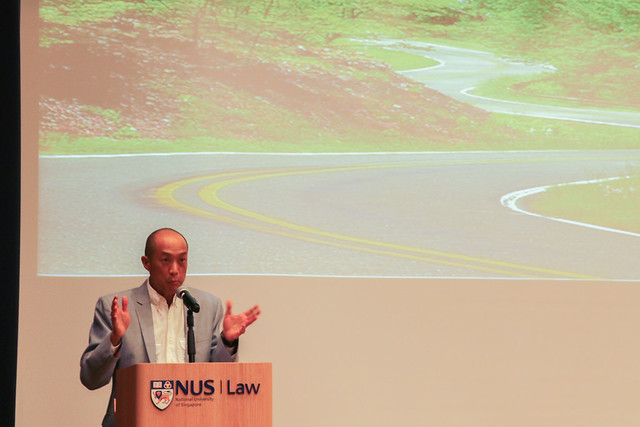
Assoc. Prof Chan Wing Cheong, who, beyond being a professor of NUS Law, is also an associate at the Asia Research Institute, founding member of the Asian Criminological Society and a staunch proponent for reform in Criminal Law
Assoc Prof. Chan Wing Cheong kicked off the dialogue with his lecture on “The Road to Abolition of the Death Penalty”. Increasingly, countries have abolished the death penalty for all crimes. While 141 countries are abolitionist, only 57 remain retentionist (countries which still use the death penalty from day to day). Prof Chan then took the time to talk about factors conducive for abolition, going through a great number of academic articles. Amongst other similarities amongst abolitionist countries, Prof Chan emphasised a few:
- Democracy, particularly parliamentary systems with proportional representation. A sizeable number of people will still support the death penalty – in a two-party democracy, this would push the political parties against arguing for abolition, so as to capture the vote. Comparatively, in democracies with multiple parties, it is much more conducive for the fostering of abolitionist debate.
- Political orientation. Left-wing parties are more likely to abolish the death penalty.
- Countries going through democratic transitions. Great political chance being an opportunity for a change in the system
- Regional norm. Great incentive to accede to Human Rights norm, for instance, the prerequisite for joining the EU including abolishing the death penalty
- Women in the legislature. Higher representation of women in the legislature can contribute towards abolition.
- Income inequality. If income inequality is high, control over the poor or marginalised may be exerted through harsh punishments, such as the death penalty.
- Ethnic Minority in population. When the minority becomes large enough, they can demand changes.
- Colonial heritage. Many countries who retain capital punishment have British colonial heritage, unlike French colonies, where they are de facto abolitionist.
Prof Chan also talked about factors with limited link to abolitionist movements, such as religion, crime rate and economic development. As a result, there are multiple implications – what are the factors that can be modified? What are our neighbours doing? (i.e. who is retentionist in the region? Who is abolitionist? Can we afford to become abolitionist without jeopardising our relations with retentionist states?) Or even, which parties can influence Singapore? (e.g. Trading Partners – 9 out of our 15 major partners are retentionist.)
Prof Chan concluded by saying that abolition would seemingly come only when we decide to do so – but when this will be, is hard to say. For example, in 2012, we removed the mandatory death penalty for certain offences, giving judges the discretion to decide. Other countries which are retentionist also experimented with moratoriums where they did not execute anyone for a period of time.
He ended the lecture on a positive note – the future remains undecided, but not bleak.
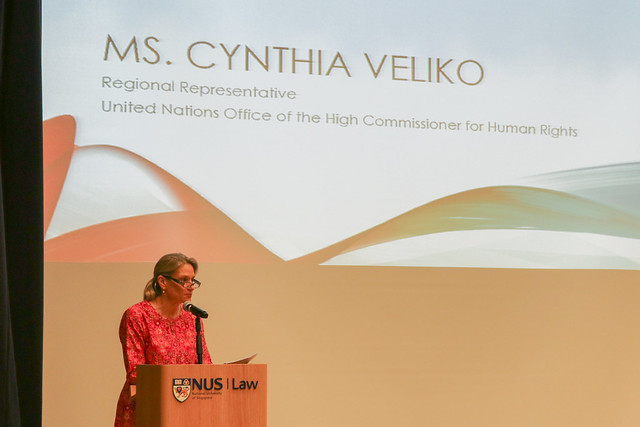
The second lecture was by Ms. Cynthia Veliko, Regional Representative of the Office of the United Nations High Commissioner for Human Rights Regional Office for South-East Asia (OHCHR).
According to Amnesty International, 141 countries have abolished the death penalty, as of December 2016. The death penalty, she stressed, should not be used for simply any offences – only for intentional killing. The UN Human Rights committee further stated that the mandatory death penalty is a clear contravention of the right to life. Retentionist states argue that the death penalty is amongst other factors, keeping with public support, an effective deterrent and protected by judicial safeguards. In response, OHCHR held a number of panel discussions to address these arguments. Several factors against retention arose, included targeting of marginalized people in society, and undue process.
The death penalty has had a long history, but the OHCHR emphasises that there is insufficient authority or evidence that the death penalty is more effective deterrent than life imprisonment. Reforming the justice system, such as through a more efficient police force, is more effective for a just and ethical management of crime.
What research has shown, she stressed, is that the death penalty has disproportionately discriminated against poor and marginalised groups in society. This results in great societal injustice. The ability for marginalised groups in society to achieve fair judicial process are thus limited by their circumstances. Moreover, the ‘popular sovereignty’ argument – that there is a democratic responsibility to reflect the population’s wishes – seems to be misguided. The role of leaders is not simply to follow the will of the people, she emphasised – it is to lead them towards greater objectives.
Ms. Veliko concluded by reiterating that the UN believes in continuous dialogue with state leaders so as to abolish the death penalty. The UN also engages with governments over imminent executions and provides technical support to regional organisations. Finally, the UN believes that state-to-state dialogue remains essential in changing these perspectives. For instance, member-states can share successful alternative models which have been able to meet policy objectives.
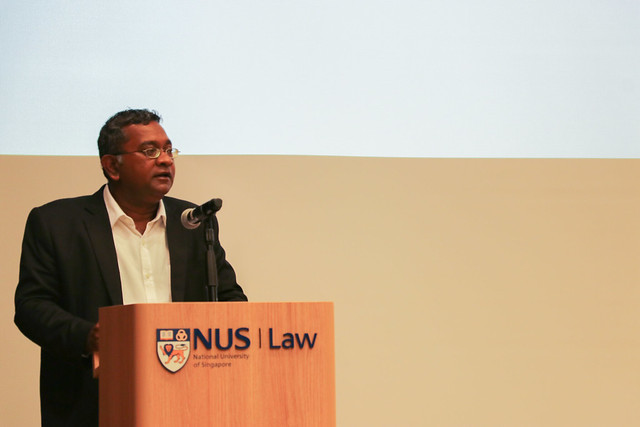
Mr. Eugene Thuraisingam, a prominent criminal and human rights lawyer in Singapore, as well as the founding partner of Eugene Thuraisingam LLP.
Next, Mr. Eugene Thuraisingam spoke about the rationale of s33B of the Misuse of Drugs Act. Section 33B was introduced in 2012, enabling judges to have the discretion to determine whether to impose the death penalty or not. Here, if the accused can prove he is a mere courier, and either:
- receives a certificate of substantial assistance from the Public Prosecutor, or;
- can be proven to have been suffering from an abnormality of mind,
the courts have the discretion to give him life imprisonment.
Only where you can prove you are only a courier, does the discretion arise. What a courier is, however, remains a matter of debate. For example, what if a courier splits his load into two, for another person to deliver? Is he still a courier? Or has he become more than just that? Should the act of splitting the drugs bring the accused outside the definition of a mere courier?
Likewise, the rationale of S33B – to enhance the operational effectiveness of the Central Narcotics Bureau and to re-calibrate the offender’s sentence based on culpability – remains open to scrutiny. As set out by DPM and Minister for Home Affairs, Mr. Teo Chee Hean, during the Second Reading for the Misuse of Drugs (Amendment) Bill, 12 Nov 2012, ‘substantive’ assistance must enhance the effectiveness of the CNB. As such, there is uncertainty in the statute over what is truly satisfies this requirement. Several MPs had contentions over the amendment as well. As pointed out by NMP Mr. Lawrence Lien, this standard has a worrying element of using the threat of death as a bargaining chip – whether one lives or dies being based solely on their utility to the state.
Further, Mr. Eugene raised the issue of how to decide whether the right has arisen or not. The Attorney-General’s decision is his and his alone – it cannot be challenged in court unless it can be shown that it was done in bad faith. The Public Prosecutor’s decisions, being not reasoned in the public, may become controversial when it comes to death penalty cases.
In the case of Prabagaran v Public Prosecutor [2017] 1 SLR 173 ,Mr. Eugene challenged the constitutionality of the section. His team argued that the discretion granted under the section was essentially a judicial function, which potentially violated the constitutional principle of separation of powers. For example, if the certificate was not given, the courts would be bound to issue the death penalty. However, if the certificate is given, the courts then have the discretion. As such, they argued that there was a potential conflict of powers when exercising the section. The Court of Appeal ruled otherwise – that the exercise of discretion is not tailored to the punishment, but is circumscribed based on whether the prescribed criterion of ‘substantive assistance’ has been satisfied. The court further emphasised that the discretion ultimately remains theirs.
Another way where one can be sentenced to life imprisonment is from showing that they suffered from abnormality of mind. But there is also the need to avoid opening the backdoor to abuse – and as Minister of Law, Mr. K Shanmugam emphasised during a parliamentary debate, while sufficiently low IQ may constitute abnormality of mind – it is not the court’s intention to extend this provision to those who do not actually suffer from a recognised and proven psychiatric condition. Mr. Eugene ended by discussing deterrence as a justification of the death penalty, emphasising the balance between morality and utilitarianism.
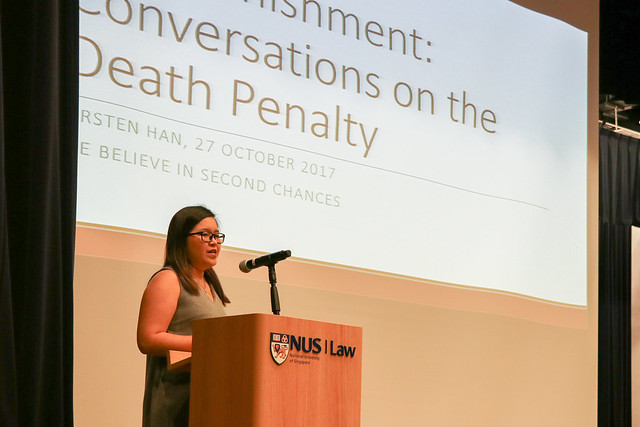
Ms. Kirsten Han, freelance journalist and writer on her website, as well as co-founder of the “We Believe in Second Chances” Group.
Rounding off the speeches, Ms. Kirsten Han gave a speech regarding the work done over at We Believe in Second Chances (WBSC)
WBSC was created initially in for Yong Vui Kong, but as they were approached by other families, the group continued, hence the slogan-like name. Since then, WSBC has grown into an activist organisation for the abolition of the death penalty, as well as to work with the inmates and their families. WBSC does research and hopes to raise awareness of the death penalty in Singapore, tracking executions and working with the families to death row inmates WBSC also helps with various issues for inmates, such as campaigns for Kho Jabing.
Ms. Han pauses to note that there seems to be no consensus on drug offences in Singapore. Abolitionists are not indifferent to the issue of drug abuse, but they don’t believe that capital punishment is necessarily the best way to curb drug abuse. The more capital punishment is relied on, the more we may be looking away from the roots of the drug issue, she posits.
WBSC also tries to tell the inmate’s story and document the family’s experiences. Minister Shanmugam, during the Opening of the Second Asia-Pacific Forum Against Drugs, called out activists as ‘romanticising’ the story of death penalty inmates. However, as Ms. Han stresses, what activists do is to instead ground it, so as to talk about policy in a holistic way. It is important that we see the impact of the death penalty not just on the inmate, but on his family and society. During the Opening of the Forum, the Minister for Law also stressed that they only carry out the death penalty ‘reluctantly, on the basis that it is for the greater good of society.‘ Ms. Han then asked the crowd why we do not recognise the inhumanity of the death penalty, even though we acknowledge we are reluctant about it. The death penalty, she stressed, is not just about legal arguments and statistics, policy objectives and efficiency – but also, about real people who are affected, day to day.
Ms. Han emphasised the importance of considering human aspects of the death penalty. Families need time to make preparations. There were cases where families were told of the rejection of clemency, and the announcement of the scheduled execution, on the same day. This does not give families enough time to prepare themselves. Likewise, it makes it difficult for activists to mobilise. Before Prabagaran’s execution, a group of people could only gather outside the prison for a candlelight vigil for Prabagaran.
Ms. Han ended her lecture by talking about the prison’s practice to take photos of the inmates in ordinary clothes, a week prior to execution. The family members are allowed to buy clothes for the inmates, after which they would have a photo shoot. Photos of those executed in the past few years, including Kho Jabing and Prabagaran, were then flashed onto the screen.
While the practice may seem morbid, given the contrast between their radiant smiles and the imminent gallows, the impact on family members is immeasurable. Ms. Han recounted a conversation with one of the inmates’ sister, who liked the photos — she said they made it seem like he was not in prison. At this point, he had been in jail for years. Likewise, for another, the family members had to pick one to be placed at the funeral procession. The emotional toll on these families is something difficult to ignore. The entire process, the pleas for clemency, the announcement of the execution, the photo shoots. The emotional toll simply cannot be explained away. And these human aspects – the impact of the death penalty – is something that we, as a society, cannot ignore.
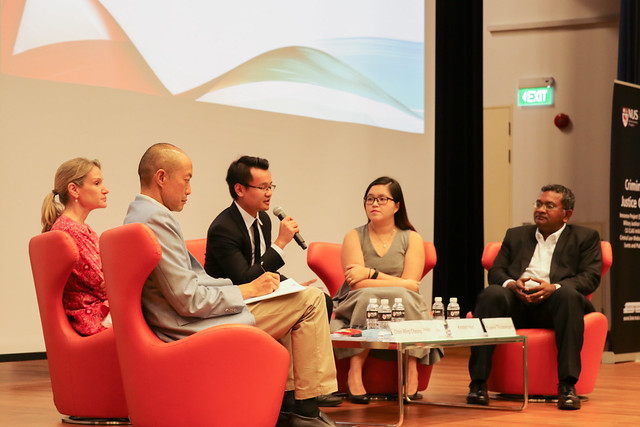
After the lectures ended, there was a moderated discussion chaired by Mr. Daryl Ong. The questions were posed to the panellists not just by Daryl himself, but through the novel use of a question and answer platform (Pigeonhole.at). The attendees were allowed to post questions online for the panellists to address during the discussion. The panellists had a fruitful and hearty discussion, answering questions and giving their frank thoughts.
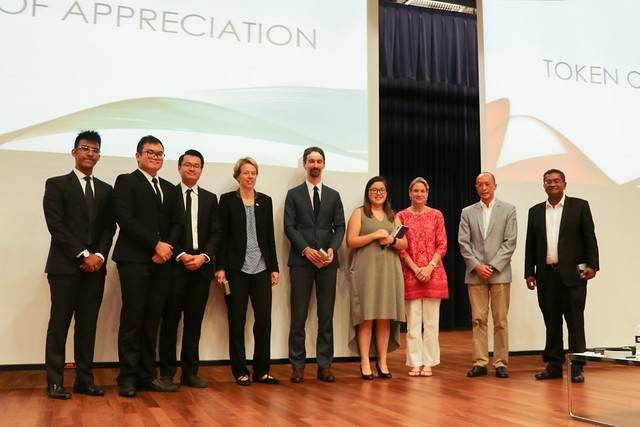
The event concluded with a token-of-appreciation ceremony with Mr. Pierre-Louis Lempereur, Head of Political and Press Information Section of the Delegation of the European Union to Singapore. After which, the panellists took a photo with the CJC team, before going out for a sumptuous tea reception.
Conclusion
The panellists came down with the intention to talk about the difficulties of abolishing the death penalty. As many panellists have noted, the death penalty seems to be unjustified, or even unjustifiable. Not only does it contravene human rights, it is not proven to be more effective than alternative punishments, especially given the option of life imprisonment, and the vast effects of the death penalty on society at large. Further, as other panellists have noted, the road to abolition is still difficult. Various factors hinder countries from switching from retention to abolition.
Moreover, one issue was that we did not get the chance to see an argument for the death penalty, the scheduled speaker being absent due to sickness. Nonetheless, the dialogue was a fruitful one. For the Year 1s, it may have been a better glimpse into the practice of Criminal Law. This is especially so when it comes to prosecutorial discretion, and the tenuous issue of drug offences. For us all, it may be yet another affirmation of our ultimate duty as future officers of the court – to promote justice and an effective judiciary. This fine balance between the individual and society – or life and death – is one that has to be delicately balanced, for the better good of society.


